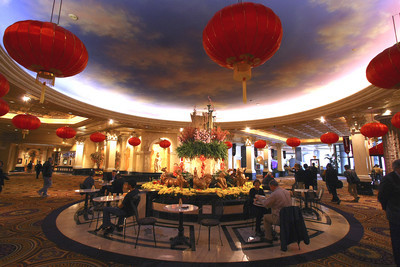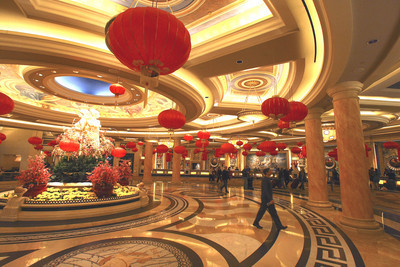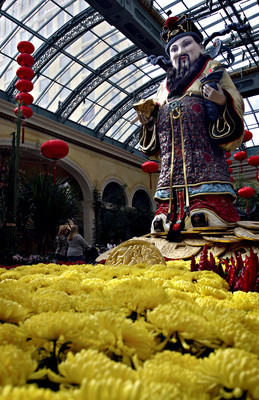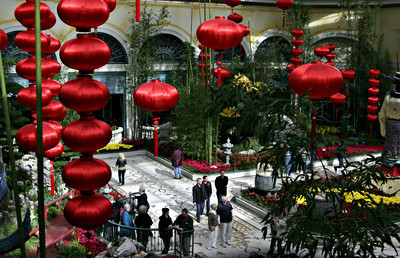Paint the Town Red
Hundreds of red paper lanterns hang at Caesars Palace; a giant statue of the god of luck and prosperity greets visitors to the Bellagio Conservatory; and red banners blanket the Strip, announcing "Xin Nian Kuai Le," in Chinese characters.
What does it all mean?
In English, it means Chinese New Year is here and that river of red translates into a cash flow of green for local resorts.
During the past 30-plus years, resorts have been reaching out to their Chinese customers, inviting them to celebrate the new year in Las Vegas. And they've been accepting the invitation, because Las Vegas is the perfect city to engage in that one major holiday tradition observed by the Chinese: gambling.
"The expression of luck and fortune at the beginning of the year is an ancient Asian tradition, especially among the Chinese," said Alan Feldman, senior vice president of public affairs for MGM Mirage. "It's a very important event for us in the industry and one that is recognized on Wall Street."
The Chinese New Year, a 15-day holiday, is set by a lunar calendar and usually falls in January or February. Today marks the first day of the Year of the Rat, which signifies prosperity and wealth. It's the first of the 12 animals that make up the Chinese zodiac.
The first property to reach out to Chinese guests was Caesars Palace more than 30 years ago, says resort President Gary Selesner. Management decorated and had a lion dance, a traditional Chinese dance that is thought to summon luck and good fortune while driving away bad luck and evil spirits.
"In the first few years, it was really for the high-end players, then more properties began to reach out," Feldman says of the holiday celebrations. "There's always such a focus on luck, we just sort of fit right in, and by adding these cultural attributes" such as the lion dances, special foods and entertainment, Las Vegas began to appeal to a wide audience.
Now the celebration is everywhere, in all levels of business, Feldman adds.
Asian restaurants extend their hours and offer special, holiday-related dishes. MGM Grand brought chefs in from Beijing this year to prepare a special banquet to be served throughout the holiday.
Resorts also book entertainers that are popular with Asian guests and schedule lion dances.
Children from The Meadows School have been performing a lion dance at the Forum Shops at Caesars for the past 12 years, notes teacher Linda Verbon.
In 2006, Asians accounted for 36 percent of the gaming revenue during the Chinese New Year, says David Huang, president of Chinese Hosts, a travel company that books rooms, entertainment and tours for Chinese tourists.
Caesars has experienced double-digit increases in revenue at the gaming tables during the past three years, Selesner says, mostly on baccarat, which is the game of choice for Asian players.
Chinese New Year has become an important niche event for the city, taking a part of the year when tourism often is flat and bringing in guests and revenue, says David Schwartz, director of gaming studies at the University of Nevada, Las Vegas.
"I think it's going to become a lot more competitive and casinos will try to outdo the other," Schwartz says. "It will be good for customers, they will have more to choose from."
Contact reporter Sonya Padgett at spadgett@reviewjournal.com or (702) 380-4564.
EVERYTHING HAS MEANING
Preparing for Chinese New Year isn't as easy as hanging some banners and party decorations.
Everything has a special meaning, from the color red to the number of fish in a pond.
The Bellagio Conservatory has been having a Chinese New Year show since the resort opened, says project manager Sharon Hatcher, using cultural elements associated with the holiday.
There are thousands of red flowers (red drives bad spirits away); tangerine trees (the sections represent abundance and the color is close to red); flowing water; 66 koi in a pond. Bridges and paths zigzag (so spirits can't follow you).
The slightest alteration or defect in something can change its meaning, often from something good to something cringe-worthy.
If a fish dies, it must be quickly removed, Hatcher says, because they represent longevity. The number must be even, as even numbers are lucky. Foliage must not appear dead or wilting as that is considered bad luck.
One year, conservatory staff placed the statue of the god of luck and prosperity over flowing water, Hatcher says. That was a bad idea, because the water threatened to wash the good fortune away.
Another time, banners with Chinese script were hung upside down, she says.
Mistakes aren't as common now, Hatcher says, because they learn from them. But occasionally, something happens.
This year, they installed incense burners and positioned them at an angle, which turned out to be an improper path for the smoke.
REVIEW-JOURNAL




















